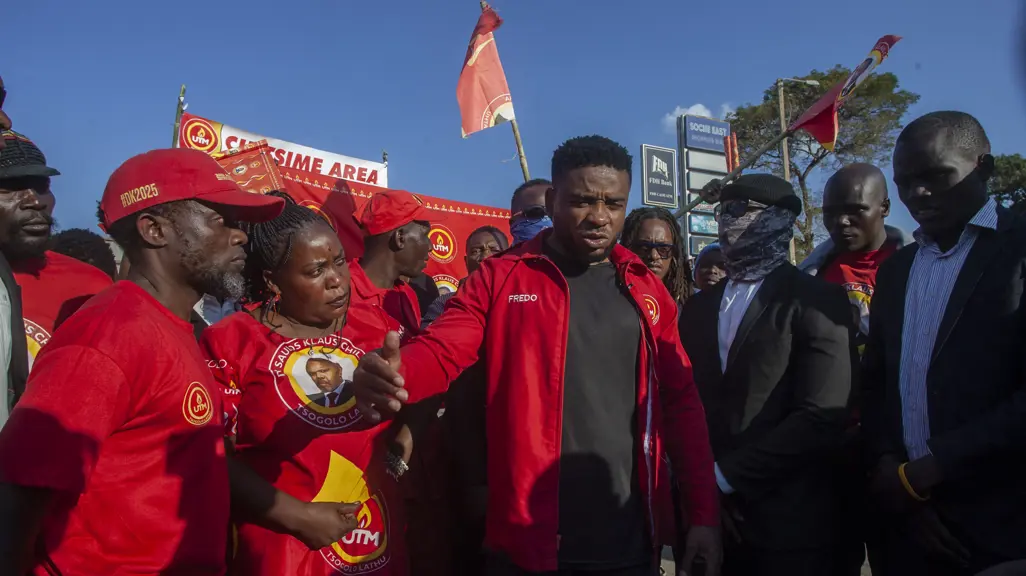
Malawian musician Fredo Penjani Kalua, known professionally as Fredokiss, spoke during an interview in Blantyre on August 9, 2025, while he and his supporters walked to a political campaign rally in Chilobwe township. Image: Getty Images.
(The Post News)– At dawn’s first light, a serpentine queue of automobiles coils around the single petrol outlet in Dedza region of central Malawi. Drivers wait through the night for fuel, a scene that highlights the growing Malawi fuel crisis affecting communities across the nation.
Frustration grips the country as persistent fuel deficits and a weakening economy weigh heavily on President Lazarus Chakwera, who campaigns for re-election in the September 16 polls. Nelson Mazola, a weary motorbike taxi operator who stood at the front of the line and nodded in frustration said “My livelihood suffers because I cannot access petrol.”
Malawi Fuel Crisis Deepens Daily Struggles
Rural communities feel the blow most acutely. Transportation costs surge, food prices climb, and families in this southern African nation struggle to survive. World Bank figures show that over 70 percent of Malawians live below the poverty line, and many now see the Malawi fuel crisis as another obstacle to daily survival.
Malawians blame the shortage on more than just insufficient supply. Stockpiling and illicit fuel trade worsen the problem. However, the central issue remains Malawi’s inadequate foreign reserves, which hinder its ability to import petroleum and other essential goods. A large trade imbalance and heavy debt repayments erode the government’s capacity to respond to the Malawi fuel crisis.
Economic Strains Weigh on Elections
The crisis extends far beyond fuel queues. Malawi, long reliant on tobacco exports, suffers from broader financial distress. A severe drought last year devastated the corn harvest, leaving 5.7 million people facing acute food insecurity, according to the World Food Programme.
Critics argue that President Chakwera’s administration has failed to manage the economy effectively since taking office in 2020. Economist Adam Chikapa warned that these hardships will weigh heavily on voter decisions, particularly as the Malawi fuel crisis continues to dominate daily life.
“Imagine spending an entire night at a petrol station, angry and exhausted, and then heading to the polling booth the next morning,” he said. “People will not forgive such frustration. Many will punish the government at the ballot box for the Malawi fuel crisis.”
In Blantyre, the country’s commercial hub, chaos surrounds petrol outlets. Drivers jostle for position near the pumps, while young vendors hawk fuel in plastic containers. They charge four to five times the official price, exploiting desperate motorists who willingly pay to keep moving despite the Malawi fuel crisis.
Calls for Reform and Growing Distrust
“Our latest survey shows that most Malawians view failed economic policies as their main grievance against the administration,” said Boniface Dulani, political analyst and survey expert at the University of Malawi.
The fuel queues stand as the starkest symbol of this grievance. They represent a wider economic storm defined by skyrocketing costs, relentless inflation, and rising transport expenses that weigh down every household budget. Dulani predicted that the governing party would suffer major losses in the upcoming polls, in large part due to the Malawi fuel crisis.
Energy experts echo the warning. Elizabeth Mwandale, an energy policy specialist at the University of Malawi, said Malawi cannot escape recurring shortages without reforming fuel procurement and foreign exchange management.
“Each time the government secures a temporary shipment, citizens breathe a sigh of relief. Yet within weeks, the same shortages return, and the Malawi fuel crisis takes hold again,” she explained.
Governance advocates highlight deeper concerns. Willy Kambwandira of the Centre for Social Accountability and Transparency (CSAT) said corruption permeates fuel procurement. “We rely on temporary fixes and flawed systems. Corrupt practices within fuel acquisition ensure that the Malawi fuel crisis remains unresolved,” he argued.
Meanwhile, voter enthusiasm wanes. Only about 66 percent of eligible Malawians, most of them young, have registered to vote. Many express skepticism toward the electoral commission and doubt whether elections can deliver meaningful change, particularly with the Malawi fuel crisis overshadowing daily life.
Mazola, the taxi driver in Dedza, echoed this skepticism. “This situation will determine how we vote,” he remarked. “We look at the hardships we face, including the Malawi fuel crisis, and ask ourselves whether life can improve if the current leadership stays in power.”
As the election nears, Malawians endure long nights at petrol stations and long days questioning their future. The queues that wind across Dedza, Blantyre, and other towns reflect not just a shortage of fuel but a shortage of trust in leadership. In every vehicle idling at dawn, voters carry both frustration and resolve, forces likely to shape the nation’s political destiny amid the ongoing Malawi fuel crisis.



